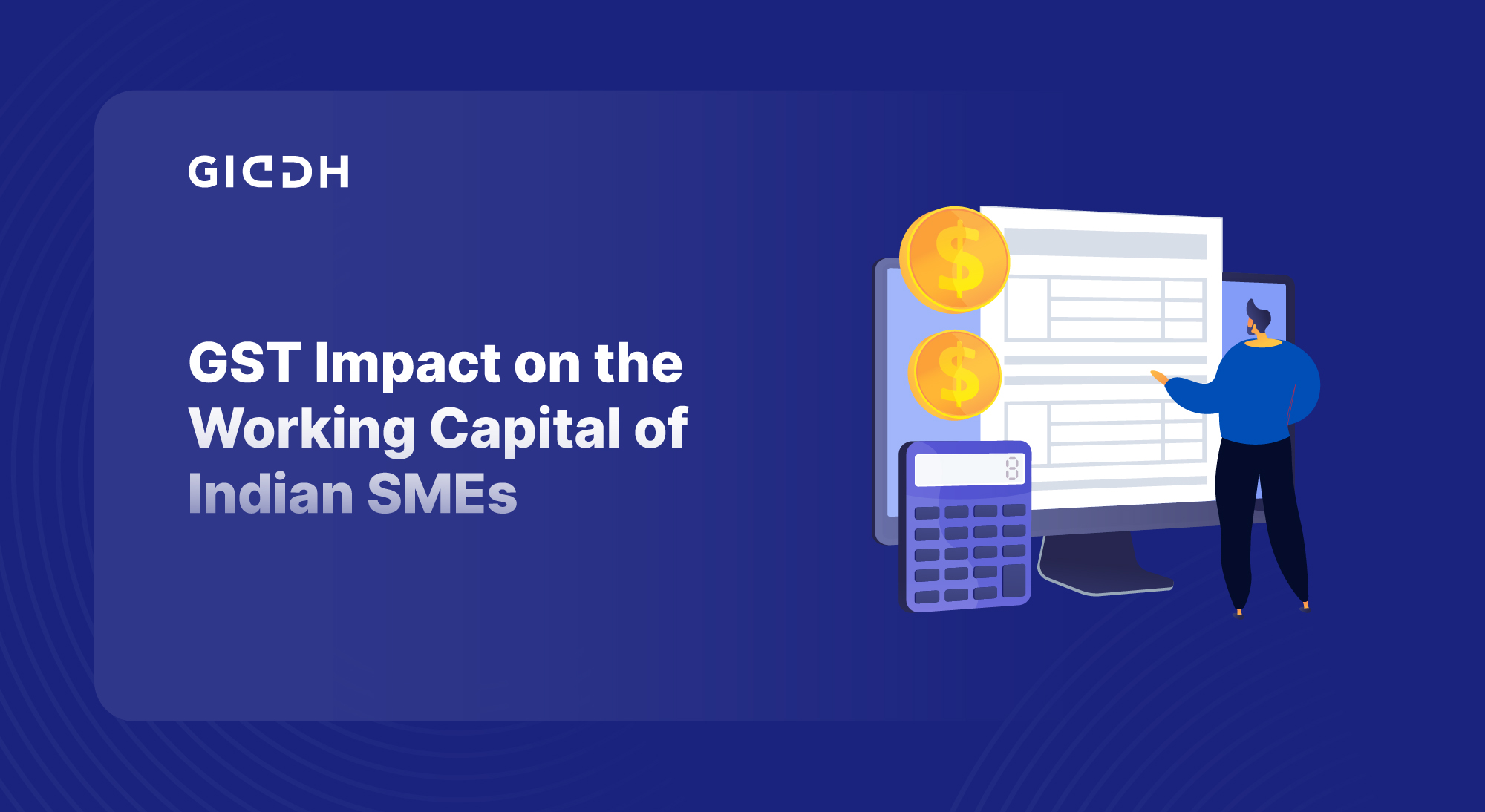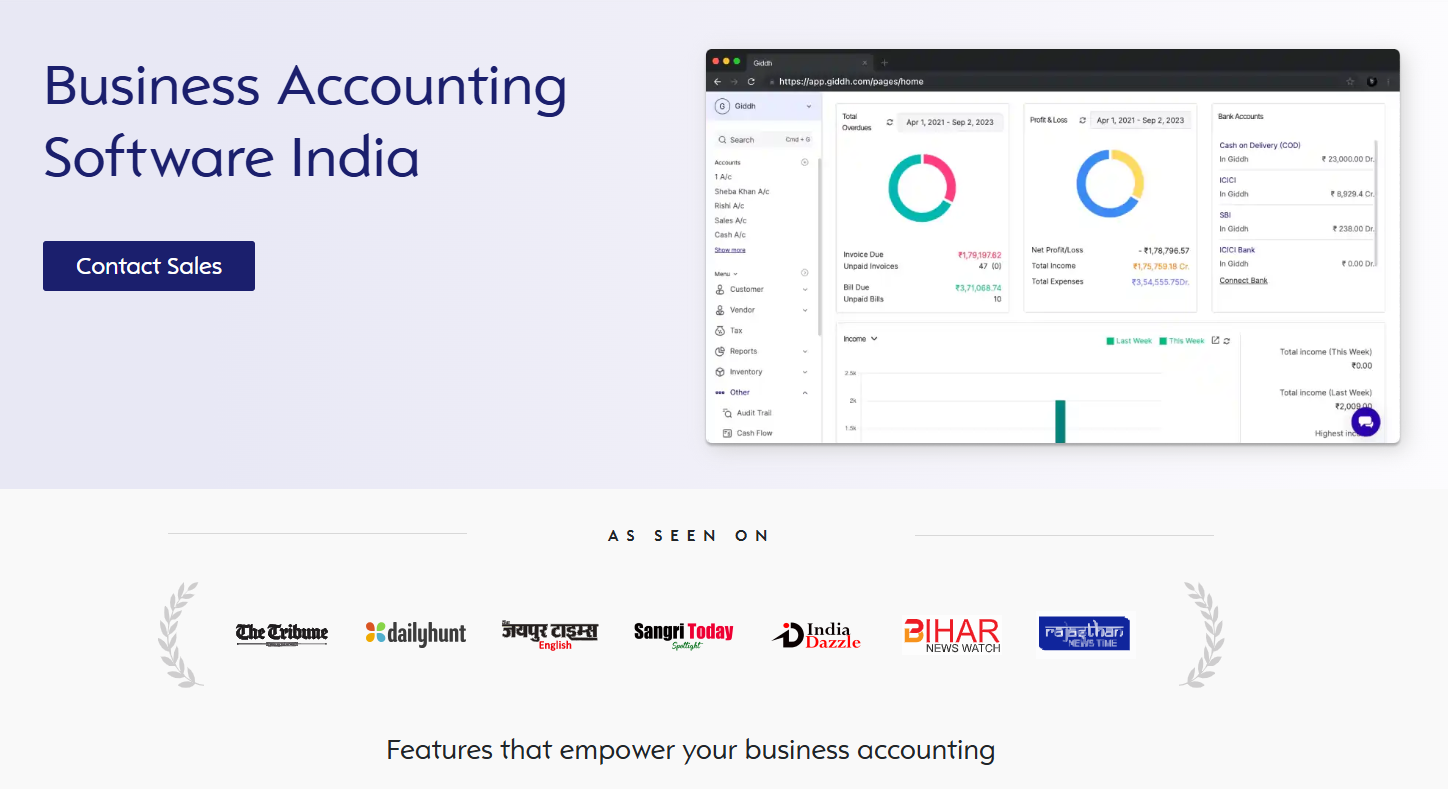How GST Impacts The Working Capital of Indian SMEs

Let’s continue our conversation about working capital and explore how GST impacts the working capital of small and medium-sized enterprises.
Management of working capital is a crucial yet complex task that all businesses must address. As we discussed in our last post, working capital helps meet the needs that arise from a business's daily operational activities and is required by both small and large companies, regardless of their size.
However, there was considerable discussion and speculation about how GST and its impact would affect the people, businesses, and the overall Indian economic landscape, given its ambitious nature.
The GST impact was done to collect indirect taxes fairly and transparently; however, small business owners have yet to understand its effectiveness.
With the rollout of GST, business owners have geared up to adapt to the entirely new tax structure. One important component that they must prepare themselves and their business for is optimizing their working capital.
The GST has several implications for a business's working capital as well. As the rollout of the GST is imminent, it is essential to understand how the GST will impact this crucial aspect of businesses.
We have compiled a list outlining how SMEs (Small and Medium Enterprises) are affected by the GST and working capital.
How Will GST Impact Your Business's Working Capital?

Let’s take a closer look at how it has affected various business processes, particularly in working capital management, logistics, e-commerce, and business expansion.
1. Furtherance of Business Concept:
Before the implementation of GST, businesses could only claim input tax credit for goods or services directly related to taxable sales. Expenses not directly tied to taxable sales were excluded from claiming input tax credit.
However, GST includes a feature known as the "Furtherance of Business" provision. This allows businesses to claim credit for inputs related to the company, even if they aren't directly involved in taxable sales.
-
Increased Credit Availability: Businesses can now access a broader range of credit, resulting in reduced immediate cash requirements.
-
Improved Working Capital: The expanded input credit scope boosts the flow of working capital, allowing businesses to allocate resources more efficiently.
-
Impact on Liquidity: This change helps businesses maintain a healthier liquidity position, ensuring smoother operations even during off-peak seasons.
2. Tax Payment Timelines Affect Capital Flow:
In the GST regime, tax is levied at the time of stock transfer, but businesses cannot claim tax credits until the actual sale occurs. This results in a time lag between the payment of taxes and the ability to reclaim those taxes.
-
Delayed Tax Credit Claims: Businesses often experience a delay between paying taxes and receiving input tax credits, which impacts their working capital availability.
-
Potential Operational Disruptions: Without proper cash reserves, businesses may struggle to meet day-to-day operational costs during this period.
-
Recommendation for Businesses: Businesses must forecast these gaps in working capital and maintain adequate reserves to avoid cash flow disruptions.
3. Simplified Goods Movement Across States:
Under the previous tax regime, businesses with multiple branches across different states faced complex compliance challenges. These businesses were required to adhere to state-specific taxes, such as Octroi and CST, when transporting goods across borders, which significantly increased their operational costs.
-
Elimination of State-Specific Taxes: GST impact on small businesses simplifies the movement of goods by eliminating state-specific taxes, such as Octroi and CST.
-
Lower Operational Costs: Businesses no longer need to manage multiple tax compliances, reducing the cost of running each warehouse.
-
Improved Logistics: With more effortless movement of goods, businesses can optimize their supply chain, reduce delivery times, and enhance operational efficiency.
-
Strategic Warehousing: Companies can now establish more efficient warehouse networks to serve national markets, thereby enhancing supply chain flexibility.
4. Impact on E-Commerce Resellers:
E-commerce sellers are impacted differently by GST. While other businesses are subject to the GST threshold limits, e-commerce sellers are required to register regardless of their turnover. The introduction of the Tax Collection at Source (TCS) mechanism by marketplace operators adds another layer of complexity.
-
GST Registration Requirement: E-commerce sellers are now required to register under GST, even if their annual turnover is below the prescribed threshold.
-
TCS Mechanism: Marketplace operators are responsible for deducting a percentage of the GST liability and remitting it to the government on behalf of sellers.
-
Cash Flow Impacts: The collection of TCS by the operator creates a delay in receiving full payment, affecting sellers’ liquidity.
-
GST Filing for Sellers: E-commerce sellers must file monthly GST returns to claim input tax credit on TCS (Tax Collected at Source) deducted, which further impacts their cash flow.
5. Ease of Launching Startups:
Before the introduction of GST, entrepreneurs faced numerous challenges related to taxes, legal procedures, and compliance across different states. Entrepreneurs had to register for different VAT schemes in each state, making it a cumbersome process to start and run a business.
-
Centralized Tax System: GST replaces state-specific taxes with a unified tax code, reducing the complexities involved in starting a business.
-
Lower Startup Costs: With simplified tax registration, the initial cost of starting a business is reduced, making it easier for entrepreneurs to launch new ventures.
-
Focus on Growth: Entrepreneurs can now focus more on growing their businesses rather than worrying about tax compliance across multiple states.
6. Reduced Human Intervention:
One of the significant benefits of GST for businesses has been the reduction in human intervention in tax compliance processes. Previously, businesses needed to interact with multiple departments to file taxes and comply with various regulations, which could be time-consuming and prone to errors.
-
Online Taxation: GST has transitioned all compliance procedures online, encompassing registration, payments, refunds, and returns.
-
Transparency: The online system enhances transparency, ensuring businesses have a clearer view of their obligations.
-
Faster Refunds: The implementation of faster refund processes in GST compliance improves liquidity, allowing businesses to access their funds more quickly.
-
Improved Compliance: Reduced human intervention reduces errors and streamlines the overall compliance process, saving businesses time and costs.
7. The Cascading Effect is Reduced:
Under the previous tax system, businesses faced a cascading tax effect, where taxes were levied on the entire value at each stage of production, even if they had already paid tax on the inputs. This led to inefficient pricing and higher costs.
-
Value-Added Tax (VAT): GST only applies tax to the value added at each stage of production, eliminating the cascading effect.
-
Lower Cost of Goods Sold: Businesses now pay less tax on inputs, reducing the overall tax burden and making their products more competitive.
-
Competitive Pricing: Reduced cascading taxes enable SMEs to offer more competitive pricing, thereby improving their market position.
-
Service Tax Benefits: Many SMEs that previously could not claim service tax credits on outsourced services can now claim these GST, lowering their overall tax liability.
Giddh: Simplifying GST Filing and Managing Its Impact on Your Business
Managing GST effectively is crucial for maintaining a healthy cash flow and ensuring smooth business operations. This is where Giddh comes in, offering a robust solution for handling GST filing and accounting.
With Giddh's user-friendly platform, businesses can ensure that GST returns are filed accurately and on time, removing the complexity from what can often be a cumbersome process.

The platform offers a direct filing feature that automatically prepares your GST return file, handling the heavy lifting for you. It ensures that you can file your returns directly on the portal with just a few clicks, saving time and reducing errors.
Key Advantages of Giddh’s GST Features:
-
Direct Filing: Giddh simplifies the process by automatically preparing and submitting your GST returns directly to the portal, making the filing process smoother and faster.
-
100% Accuracy: The platform helps businesses achieve perfect accuracy by identifying errors before submitting the return. The straightforward error sheet ensures that every submission is flawless, reducing the risk of penalties.
-
Timely Notifications: Never miss another deadline again. Giddh sends timely reminders to ensure you submit your returns on time, avoiding penalties and unnecessary stress.
-
Highly Collaborative: Giddh’s role-based access allows your team to collaborate seamlessly. You can grant your Chartered Accountant (CA) access to the relevant GST data, ensuring smooth collaboration and transparency.
-
Secure & Reliable: Security is a top priority. With 2-factor authentication, industry-leading security measures, and OTP verification, Giddh ensures that your GST filing process remains secure from start to finish.
-
Best in Class Support: If you run into issues, Giddh’s knowledgeable support team is always available to help with any accounting or GST filing queries, ensuring you’re never left stuck.
With features that enhance accuracy, save time, and ensure collaboration, Giddh is the ideal tool for managing your business’s GST needs effectively.
In Closing
Lastly, working capital management under GST helps enhance the agility and financial growth of a business, particularly when the business is classified as an SME.
In the GST regime, the working capital of a business has been impacted, depending on its type & size. Businesses today must take a leap of faith and place their belief in the technological advancements that will help them manage their working capital.
Cloud-based solutions today serve the needs of business owners with their GST filing features, along with reporting and analytical tools, enabling them to stay compliant and maintain a firm grip on their business.
Have questions or insights to share? Try Giddh for free and discover how GST is affecting your business, as well as how we can help you optimize your working capital management.
FAQs
1: What are the key considerations for SMEs under GST?
Answer: SMEs must ensure accurate GST registration, timely returns filing, and proper documentation for input tax credits. Staying up to date on applicable GST rates and exemptions is crucial for compliance.
2: How can accounting software help SMEs manage GST and working capital better?
Answer: Accounting software automates GST filing, tracks expenses, and offers real-time insights into cash flow and working capital, reducing errors and ensuring timely compliance.
3: Why is working capital necessary for SMEs under the GST system?
Answer: Working capital is essential for SMEs to manage cash flow delays caused by the GST system, ensuring they can cover daily operations while waiting for input tax credits.

